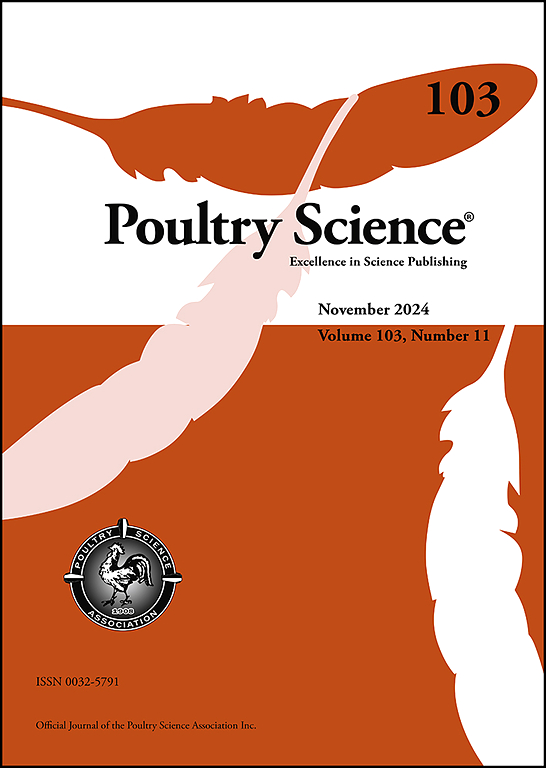Crisis and risk management in poultry production: Preparing future leaders for sustainability and food security
IF 4.2
1区 农林科学
Q1 AGRICULTURE, DAIRY & ANIMAL SCIENCE
引用次数: 0
Abstract
Poultry production sector is a cornerstone of food security at national and global levels, providing a vital source of animal protein. However, it faces mounting challenges, including epidemics, avian diseases, supply chain disruptions, climate change impacts, and rising production costs. Despite the significance of these risks, crisis and risk management remain underrepresented in higher education curricula for this essential industry. This study explores the importance of developing the knowledge and skills of poultry science students in crisis and risk management as future leaders in the poultry industry, as well as enhancing their employability, with the aim of ensuring sector sustainability and strengthening food security. A qualitative descriptive methodology, including an extensive literature review, was employed to assess the impact of crises and risk management on industry sustainability and on shaping student competencies for effective leadership in addressing challenges. Findings reveal a significant gap in poultry science education regarding crisis and risk management, undermining graduates’ readiness to lead during real-world emergencies. Simultaneously, stakeholders and academic institutions increasingly call for embedding these essential skills into curricula, recognizing their role in enhancing graduate employability and industry resilience. The study recommends reviewing and developing poultry science programs to incorporate concepts of crisis and risk management, alongside providing advanced training in collaboration with industry partners and stakeholders. It also emphasizes the need to recognize risk management as a core component of quality assurance standards within poultry science programs to ensure sector sustainability and promote academic and professional excellence. Additionally, the study provides guidance to policymakers and decision-makers in higher education institutions and poultry science programs on the importance of preparing students to become strategic leaders capable of effectively managing crises, making informed decisions, and safeguarding the sustainability of the poultry industry in the face of future challenges with confidence and competence.
家禽生产中的危机和风险管理:为可持续性和粮食安全培养未来的领导者。
家禽生产部门是国家和全球粮食安全的基石,是动物蛋白的重要来源。然而,它面临着越来越多的挑战,包括流行病、禽类疾病、供应链中断、气候变化影响和生产成本上升。尽管这些风险很重要,但危机和风险管理在这个重要行业的高等教育课程中仍然没有得到充分的体现。本研究探讨了培养家禽科学专业学生在危机和风险管理方面的知识和技能,使他们成为家禽行业未来的领导者,以及提高他们的就业能力的重要性,目的是确保行业的可持续性和加强粮食安全。采用定性描述方法,包括广泛的文献综述,评估危机和风险管理对行业可持续性的影响,以及塑造学生应对挑战的有效领导能力的影响。调查结果显示,家禽科学教育在危机和风险管理方面存在重大差距,削弱了毕业生在现实世界紧急情况下的领导能力。与此同时,利益相关者和学术机构越来越多地呼吁将这些基本技能纳入课程,认识到它们在提高毕业生就业能力和行业弹性方面的作用。该研究建议审查和制定家禽科学计划,以纳入危机和风险管理的概念,同时与行业合作伙伴和利益相关者合作提供高级培训。它还强调有必要将风险管理视为家禽科学项目质量保证标准的核心组成部分,以确保部门的可持续性,并促进学术和专业的卓越。此外,该研究还为高等教育机构和家禽科学项目的政策制定者和决策者提供了指导,说明培养学生成为战略领导者的重要性,这些领导者能够有效地管理危机,做出明智的决策,并在面对未来挑战时充满信心和能力地维护家禽业的可持续性。
本文章由计算机程序翻译,如有差异,请以英文原文为准。
求助全文
约1分钟内获得全文
求助全文
来源期刊

Poultry Science
农林科学-奶制品与动物科学
CiteScore
7.60
自引率
15.90%
发文量
0
审稿时长
94 days
期刊介绍:
First self-published in 1921, Poultry Science is an internationally renowned monthly journal, known as the authoritative source for a broad range of poultry information and high-caliber research. The journal plays a pivotal role in the dissemination of preeminent poultry-related knowledge across all disciplines. As of January 2020, Poultry Science will become an Open Access journal with no subscription charges, meaning authors who publish here can make their research immediately, permanently, and freely accessible worldwide while retaining copyright to their work. Papers submitted for publication after October 1, 2019 will be published as Open Access papers.
An international journal, Poultry Science publishes original papers, research notes, symposium papers, and reviews of basic science as applied to poultry. This authoritative source of poultry information is consistently ranked by ISI Impact Factor as one of the top 10 agriculture, dairy and animal science journals to deliver high-caliber research. Currently it is the highest-ranked (by Impact Factor and Eigenfactor) journal dedicated to publishing poultry research. Subject areas include breeding, genetics, education, production, management, environment, health, behavior, welfare, immunology, molecular biology, metabolism, nutrition, physiology, reproduction, processing, and products.
 求助内容:
求助内容: 应助结果提醒方式:
应助结果提醒方式:


